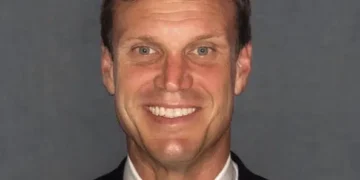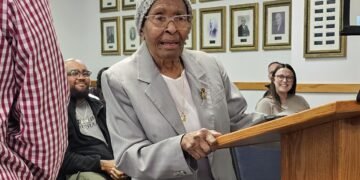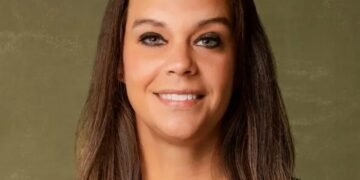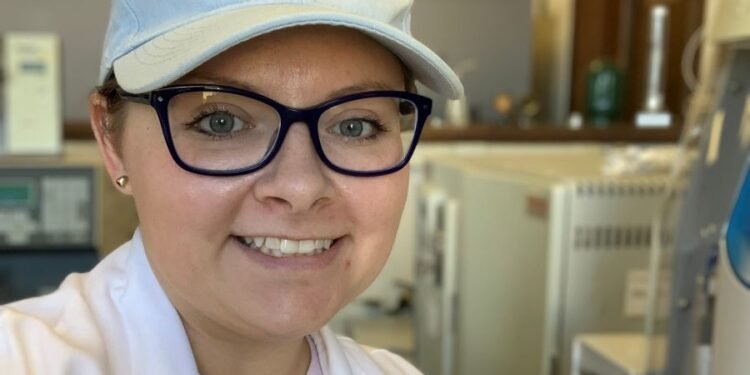Henderson native Brenna Caudill is observing Women’s History Month this year in a notable way. She’s making a little history herself.
Caudill was recently named the first female (and youngest) superintendent for the Filtration Plant of the Evansville Water & Sewer Utility, which makes her the certified operator in charge of producing all the drinking water for Evansville and surrounding communities, serving approximately 74,000 service connections.
After previously serving as water quality manager, her main goal in her new position is already firmly imprinted on her workday.
“My goal always in this position is to keep producing safe drinking water but I want to keep moving the mark forward so that we are producing the safest drinking water that we can,” she said.
Caudill knew early in her school days that she would someday be a scientist. Her first inspiration was to be a doctor specializing in emergency medicine, which she started working toward in her undergraduate days at Georgetown College. She dreamed about becoming affiliated with Doctors Without Borders.
But midway through her studies, she discovered that she had another passion in the scientific realm.
“I realized that I had a passion for studying air and water quality,” she said. The bachelor’s of science degree in environmental science she earned at Georgetown eventually landed her a job as a lab technician in the water quality lab at EWSU.
That gave her the opportunity to pursue her career in her home area, where she lives with husband Alex (who works in the office of Kentucky Gov. Andy Beshear) and their 4-month-old daughter, Lorena.
Since landing that first lab job, her master’s degree in environmental science from Louisiana State University added to the tools that gave her the credentials to advance, first as water quality manager after Tim Hall (another Hendersonian) retired and now as superintendent upon the retirement of Rick Glover.
“Both of my degrees compounded on each other give me a unique combination of chemistry, biology and regulatory compliance,” Caudill said. “Water treatment is as much of a science as it is a mechanical process, and having a good grasp on how chemical additions can affect the way water is treated is beneficial in this field.”
“In addition to managing 26 employees, first and foremost is the filtration plant operation. The plant takes in on average 24 million gallons of water a day from the Ohio River and cleans it through a conventional water treatment process. This process includes coagulation, flocculation, sedimentation, disinfection and filtration.
“The water that leaves the plant is then distributed … and I also oversee the booster stations and storage facilities,” Caudill explained. “I am the legally responsible party for signing off on our reports attesting that the water we process is safe to drink and meets all primary and secondary drinking water standards set by the EPA.”
For the past four years, Caudill has also been an instructor through the American Water Works Association, teaching future operators who come from utilities across southern Indiana.
“My teaching experience has helped me learn and relearn concepts of water treatment every year,” she said.
The superintendent said her days can be really varied.
“On any given day I can go from sitting in a meeting with engineers, to putting my lab coat on and running tests on our Gas Chromatograph Mass Spectrometer (GCMS), to getting inside a concrete encased channel that hasn’t been opened for 100 years, to standing in front of news cameras to explain how we are monitoring the river after spills,” she said. “I wear many hats in my role, (and) some of them get dirtier than others.”
The fact that she’s the first female and youngest person to oversee the filtration plant isn’t lost on Caudill.
“I think the biggest challenge is my own self-doubt,” she said. “I struggle with imposter syndrome at times and not feeling like I’m deserving of recognition.”
She said the feeling was especially acute when she became water quality manager, but Glover, the superintendent at the time, gave her some great advice.
He said: “You know more about your job than anyone else here and you just have to vocalize it.” “That advice has really helped transition my thinking, because he wasn’t telling me, ‘I’m the smartest person here’—something that I thought I needed to be. He was telling me that I’m the most knowledgeable of my position,” she said. “And because of that advice I’ve been able to empower myself.”
Now she’s able to empower others, just as Glover and others, including high school chemistry teacher Velvet Dowdy, college environmental science professor, Dr. Rick Kopp, and former EWSU lab tech and mentor, Mona Berkemeier, empowered her.
“It is my intent to be really good at what I do and to set up ways that others can follow behind me,” Caudill said. “I am of the mindset that I must be the most educated and hardest working member of my team so that I am setting an example for my staff but also for decision makers that may look to hire more young professionals and women. I also try to look out for others that I can help empower and move up.”
She also wants to be a voice that helps customers of this public utility understand the detailed work that’s done to provide a safe and quality product. “I think water departments are hidden gems that people often overlook,” Caudill said. “It is not always common to wonder how clean water is getting into your home. You just know it is there.”



















